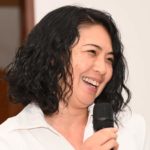Please let me introduce myself.
I am Seiko, Japanese.
I am a psychotherapist who is also a life-long Buddhist practitioner since my childhood.
My journey
My journey towards finding my emotional freedom is inseparable with my experience as an immigrant. Please let me share a little bit about my story:
What does it really mean to be “me”?
When I was young I dreamed of living overseas. 17 years ago I had a job offer here in Aotearoa New Zealand and I seized the opportunity to move to a new country.
I fulfilled a dream but, I had no idea that living in a foreign country would entail such painful challenges.
Living here in New Zealand I was overwhelmed by cultural differences and language barriers.
Not being able to express myself freely nor to completely understand what people were saying led to an inferiority complex.
I really struggled with my reduced sense of self.
I despised my difference. My limitations in this country made me feel alienated and incompetent.
My sense of being left out and unimportant was so painful.
I had learned to cover up my inferiority complex by not speaking out.
My fear of being judged crushed my spontaneity.
These painful experiences finally forced me to delve into what it really meant to be “me” in this country.
Deep acceptance of myself
Both Buddhism and psychotherapy have helped me gradually become aware of my shame and fear that I had denied unconsciously.
I had to dig through so many layers of fear, insecurity, anger and grief before I could reach my innermost truths.
Through learning to stay loyal to my feelings in this present moment, I’ve discovered and experienced so much more of myself.
I’ve learned what it feels to be different. I felt reduced and invisible. That really hurt.
But what hurt me even more was that I tried to be someone I was not. I didn’t acknowledge who I really was.
Through my painful reflection, I came to realise that it was not my difference that reduced my sense of self. It was me who denied and criticised my difference, which was a unique part of me.
The reduction of self is equivalent to a violence to ourselves.
Full acceptance of who I really was emerged through grief that I had limitations and I could never be myself like who I was in Japan.
At the moment of deep acceptance of myself, my deepest grief turned into into deepest love of my life and that of others.
Vulnerability as inner strength
From my experience I arrived at a most profound revelation:
Finding my emotional truths leads to emotional freedom.
My vulnerability is an opening into a place deep inside me which is pure, authentic, compassionate and undefeated.
I have learned that I can only savour the fullness of who I am when I am completely and compassionately with my vulnerable parts.
Vulnerability is not enemy
I have long believed that vulnerability was the cause of suffering, so it had to be eliminated.
But I got it all wrong.
Through the practice of psychotherapy and Buddhism, I have come to the realisation that it is our vulnerability that allows our compassion and courage to emerge.
When we see our vulnerability as the gateway towards the best and most beautiful parts of us, we realise that our life is a cluster of blessings.
We are always already enough as we are.
What matters most is to be whole, not being perfect
Both psychotherapy and spirituality have taught me a path towards wholeness and create a joy of life from within my own life.
It is my passion to make wisdom of both practices available to everyone for building a fulfilled life.
I believe that we all have the capacity to transform our challenges into a source of growth and creativity.
It is my hope that I offer support for you to live true to yourself.
Seiko’s approach
A fundamental resolution for emotional difficulties lies in our capacity to be true to ourselves.
Seiko’s training background
Psychotherapy training includes a wide range of therapy theory and practice:
Psychodynamic Psychotherapy, Person-Centred Psychotherapy, Acceptance and Commitment Therapy, and Cognitive Behavioural Therapy.
I have learned hypnotherapy from Dr. Brian Weiss, a psychotherapist who is also a pioneer of past life regression therapy, and Mr. Keiichi Murai, a pioneer of hypnotherapy in Japan.
Qualifications
Auckland University of Technology Master of Psychotherapy (Hons)
Auckland University of Technology Graduate Diploma in Psychotherapy Studies
National Guild of Hypnosis Hypnotherapy Master Course
Japan Board of Clinical Hypnotherapists Hypnotherapy Basic Course
Brian Weiss Past Life Therapy Workshop
Books that have influenced my thinking
- Creating the value of life – Fumihiko Iida
- Many lives, many masters – Brian Weiss
- Life lessons – Elisabeth Kubler-Ross & David Kessler
- The gift of imperfection: Let go of who you think you’re supposed to be and embrace who you are-Brene Brown
- Lectures on “On attaining Buddhahood in this lifetime” – Daisaku Ikeda
- Psychoanalytic psychotherapy – Nancy McWilliams
- Character style – Stephen Johnson
- In an unspoken voice: How the body releases trauma and restores goodness – Peter Levine
- The mind & the brain: Neuroplasticity and the power of mental force-Jeffrey Schwartz M.D. and Sharon Begley
- Proof of Heaven: A Neurosurgeon’s Journey into the Afterlife-Eben Alexander
- Dying to be me – Anita Moorjani
- Many mansions: The Edgar Cayce story on reincarnation – Gina Cerminara
- The inner philosopher: Conversations on philosophy’s transformative power – Lou Marinoff & Daisaku Ikeda
Other Japanese authors such as Noboru Komiya, Tetsugai Obo, and Jinnosuke Kokoroya have influenced my thinking and practice as well.
